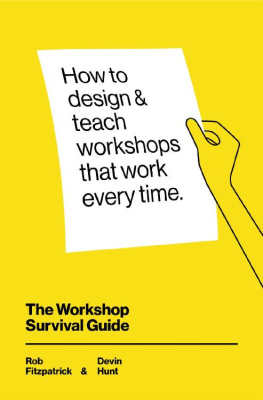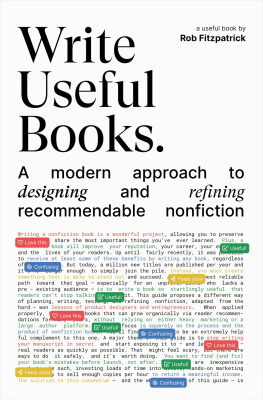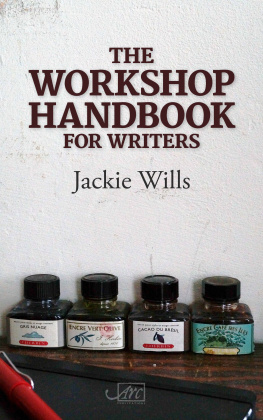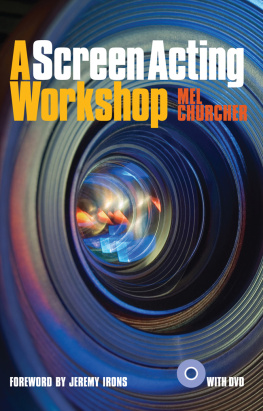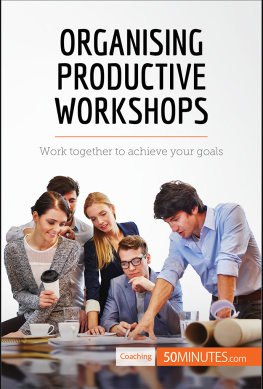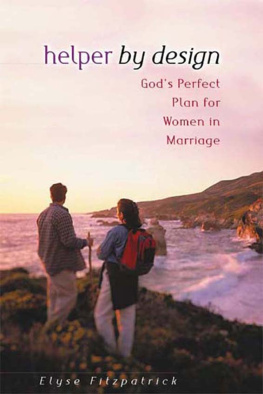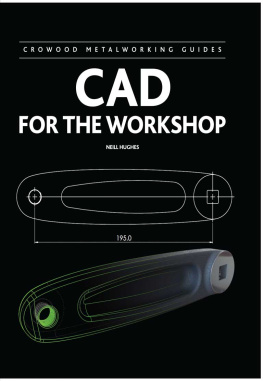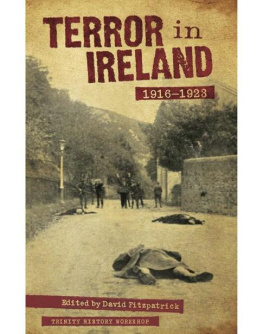Rob Fitzpatrick - The Workshop Survival Guide: How to design and teach educational workshops that work every time
Here you can read online Rob Fitzpatrick - The Workshop Survival Guide: How to design and teach educational workshops that work every time full text of the book (entire story) in english for free. Download pdf and epub, get meaning, cover and reviews about this ebook. year: 2019, genre: Home and family. Description of the work, (preface) as well as reviews are available. Best literature library LitArk.com created for fans of good reading and offers a wide selection of genres:
Romance novel
Science fiction
Adventure
Detective
Science
History
Home and family
Prose
Art
Politics
Computer
Non-fiction
Religion
Business
Children
Humor
Choose a favorite category and find really read worthwhile books. Enjoy immersion in the world of imagination, feel the emotions of the characters or learn something new for yourself, make an fascinating discovery.
- Book:The Workshop Survival Guide: How to design and teach educational workshops that work every time
- Author:
- Genre:
- Year:2019
- Rating:5 / 5
- Favourites:Add to favourites
- Your mark:
- 100
- 1
- 2
- 3
- 4
- 5
The Workshop Survival Guide: How to design and teach educational workshops that work every time: summary, description and annotation
We offer to read an annotation, description, summary or preface (depends on what the author of the book "The Workshop Survival Guide: How to design and teach educational workshops that work every time" wrote himself). If you haven't found the necessary information about the book — write in the comments, we will try to find it.
Rob Fitzpatrick: author's other books
Who wrote The Workshop Survival Guide: How to design and teach educational workshops that work every time? Find out the surname, the name of the author of the book and a list of all author's works by series.
The Workshop Survival Guide: How to design and teach educational workshops that work every time — read online for free the complete book (whole text) full work
Below is the text of the book, divided by pages. System saving the place of the last page read, allows you to conveniently read the book "The Workshop Survival Guide: How to design and teach educational workshops that work every time" online for free, without having to search again every time where you left off. Put a bookmark, and you can go to the page where you finished reading at any time.
Font size:
Interval:
Bookmark:
The Workshop Survival Guide
How to design and
teach workshops
that work every time
By Rob Fitzpatrick and Devin Hunt
All rights reserved, Robfitz Ltd, 2019
http://workshopsurvival.com
Contents
Dont start with the slides
(do start with the Skeleton)
Why this book (and these authors) can help
There are many good styles of workshops and many good ways to design them.
As such, we are in no way claiming that the approach presented in this book is the only way. Nor are we claiming that facilitators who are doing it differently are doing it wrong.
But we are claiming that this approach is a very good way (and possibly the best way for facilitators who are just starting out). Its good because its simple, its reliable, and it works . Simple means we can tell you how to do it in a way which is concrete, understandable, and easy to implement. Reliable means that it will work with every type of audience and for almost every topic and will do so every time. And we know it works because weve used this approach to teach many hundreds of workshops ourselves and have trained others to successfully do the same.
During our first ten years of teaching, we were enthusiastic amateurs: first as teaching assistants in university classrooms, and then running small workshops and lectures to share our ongoing startup experiences with other entrepreneurs. Workshops then became our full-time profession, first as freelancers and then while running a small education agency.
Weve now designed and run a huge number of successful workshops (and a few major flops) covering every type of audience: executives, undergrads, MBAs, disadvantaged youths, busy professionals, and more. Weve designed everything from 20-minute teasers to 3-month intensives, in locations ranging from Costa Rica and Qatar to London and Berlin. Weve taught for companies like HP and Deloitte and for universities like Oxford and NYU. Weve built workshops for every price point, from free upskilling (paid for by the state or employer) through to $4000-per-seat premium events. Weve taught casual sessions, with beer in hand and flip-flop on foot, through to formal, posh affairs with glitzy venues and high-end catering. In every case, no matter where it was located or who it was for, the process outlined in these pages worked.
Perhaps most importantly, we can teach you how to do this. And you dont need to turn into some kind of charismatic superstar for it to work. In fact, you dont even need to be particularly confident. You only need to know how to design a good workshop. Weve trained up teachers from scratch who are now billing upwards of 2000 per day and getting invited back to teach again and again. This stuff isnt complicated. You can learn it and you can do it.
Our goal for this bookand our promise to youis that youll feel comfortable designing a workshop from scratch and running it successfully, regardless of whether its 20 minutes or two days long. Youll also be able to fix a broken workshop that youve been saddled with. While the first attempt at a new workshop is never perfect (testing and refinement matter), it should still be good enough that both clients and attendees leave happy, and that you get invited back. Throughout this book, youll also gain the skills and knowledge such that if something goes wrong, youll understand whats happening and how to fix it. Whether workshops are your whole world or just a small part of it, we can help you succeed.
Please note that this book is primarily about educational workshops, where the goal is to teach, upskill, and educate (as opposed to brainstorming or consulting workshops). Much of what we cover will apply to all varieties of workshops, but well only be going into the full process for the educational ones.
This book draws on both Rob and Devins experiences. But in an attempt to keep the language simple and avoid having to constantly clarify who did what, well generally just merge our stories, anecdotes, and opinions into a shared first person I.
Lastly, a word of thanks. This book wouldnt be possible without the expertise and influence of the countless wonderful people who weve had the pleasure of teaching alongside over the years. Huge thanks to all of them, and especially to Salim Virani, who was with us in the trenches for the pivotal years when we were all figuring this stuff out together.
How to use this book
Part 1 covers the essentials of workshop design , which includes picking precisely what to teach, designing brilliant exercises, and figuring out your schedule. Its all the stuff you do beforehand to make the day itself as easy and successful as possible.
Part 2 covers the essentials of facilitation . It starts with how to introduce yourself and then continues to the challenge of how to smoothly form groups, run exercises, and recover the crowds attention. Well also look at dealing with bad luck, hostile crowds, hostile individuals, slipped schedules, and more.
The Appendix contains a few advanced approaches to designing specialized workshop exercises.
Lets get into it.
Part one
Workshop Design Essentials
Every workshop lives or dies by two factors:
What the audience learns
How the audience feels (i.e. energy and attention)
Compared to a traditional class or lecture, a workshop has two special qualities. The first is that instead of expecting the audience to pay attention, youll be taking responsibility for their energy and attention by designing the session in a way which continually renews and refreshes them. By working to boost their energy, youll also boost their ability to pay attention, which ultimately makes it easier for them to learn.
Attention is the first step in the learning process. We cannot understand, learn or remember that which we do not first attend to.
CDL, Center for Development & Learning
The other special quality of a workshop is that youre able to coordinate what youre teaching with how you teach it. Or in other words, you have the opportunity to escape the constraints of the lecture and start picking the styles of teaching and types of exercises best suited to the topic at hand. Imagine showing up to a yoga class where the instructor put you in a chair, lectured for an hour, and then told you to go home and practice. Youd be mad! And thats exactly how lots of lectures end up feeling. Lectures work fine for delivering pure book knowledge, but are terrible for teaching anything involving skills, wisdom, evaluation, practice, decision-making, and judgement.
Well get to the question of facilitation in Part 2. But I want to be clear that the crux of a brilliant workshop lies in what you do beforehand . When a workshop is well-designed, it does most of the heavy lifting for you, and facilitation becomes naturally easy. On the other hand, all the fancy facilitation tricks in the world still wont save you if you havent properly designed the foundation.
Maintain goodwill with regular a-ha moments
Most workshops begin with the audience liking you. You have their goodwill, they trust you, and youre credible. Its like the suspension of disbelief in sci-fi and fantasy movies: people show up wanting to be entertained, so theyre happy to suspend their skepticism and go along with some crazy shenanigans. But if the movie goes too far and becomes laughable, the suspension snaps and the viewers become hostile. The same is true for your audiences goodwill.
You can think of goodwill as a consumable (and renewable) resource:
You lose goodwill whenever you make the audience sit through boring stuff (like a long intro) or participate in low-value exercises (like an off-topic icebreaker )
You gain goodwill whenever you deliver a nugget of value (usually in the form of a valuable a-ha moment or takeaway)
Font size:
Interval:
Bookmark:
Similar books «The Workshop Survival Guide: How to design and teach educational workshops that work every time»
Look at similar books to The Workshop Survival Guide: How to design and teach educational workshops that work every time. We have selected literature similar in name and meaning in the hope of providing readers with more options to find new, interesting, not yet read works.
Discussion, reviews of the book The Workshop Survival Guide: How to design and teach educational workshops that work every time and just readers' own opinions. Leave your comments, write what you think about the work, its meaning or the main characters. Specify what exactly you liked and what you didn't like, and why you think so.

